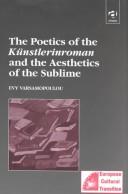| Listing 1 - 2 of 2 |
Sort by
|

ISBN: 0754602966 Year: 2002 Publisher: Aldershot : Ashgate,
Abstract | Keywords | Export | Availability | Bookmark
 Loading...
Loading...Choose an application
- Reference Manager
- EndNote
- RefWorks (Direct export to RefWorks)
This study of the poetics of the Romantic K nstlerinroman (female artist novel) brings to the foreground its salient metafictional discourse on the aesthetics of the sublime, ever since its beginnings in Madame de Sta l's "Corinne ou L'Italie". The book presents detailed readings of H.D.'s "Palimpsest", Christa Wolf's "Nachdenken ber Christa T." and Marguerite Duras' "L'Amant" in a dialogue with Kant, Freud, Lacan, Cixous, Derrida and other philosophers, theorists, literary critics and writers. Each novel is explored in terms of its generic affiliations, its reflections on the role of literature and the writer in society and its aesthetic discourse on the sublime. The book stages an inquiry into the relation between genre, the sublime, gender and literary history from which emerge insights into the conditions of subjectivity underlying the experience and communication of the sublime.
European fiction --- Künstlerromane --- Women and literature --- Women artists in literature. --- Women authors --- History and criticism. --- Roman européen --- Femmes écrivains européennes --- Femmes écrivains --- Histoire et critique
Book
ISBN: 9781032334660 Year: 2024 Publisher: New York London Routledge
Abstract | Keywords | Export | Availability | Bookmark
 Loading...
Loading...Choose an application
- Reference Manager
- EndNote
- RefWorks (Direct export to RefWorks)
Romantic Futures is a collection which explores the significance of futurity in British Romanticism from a comparative perspective in three defining manifestations: the future as conscious legacy, by which is meant both influences or continuities and the (anticipations of) impact on the future; the future as revealed by prophecy, whether via religious figures or superstitions; and a meditation on the temporality of the future, or the future as a concept. The book brings together a wide range of theoretical and disciplinary perspectives: from utopian studies, history, religion, and cultural theory to future studies, neuroscience, video games, and art history. Aiming to increase and diversify current critical engagement and highlight the contemporary relevance of the Romantics’ multivalent preoccupation with the future, this collection renews the dialogue between Romanticism and our critical relation to its contemporaneity, especially as it speaks to current understandings of the future in the sciences, arts, and humanities.
| Listing 1 - 2 of 2 |
Sort by
|

 Search
Search Feedback
Feedback About UniCat
About UniCat  Help
Help News
News